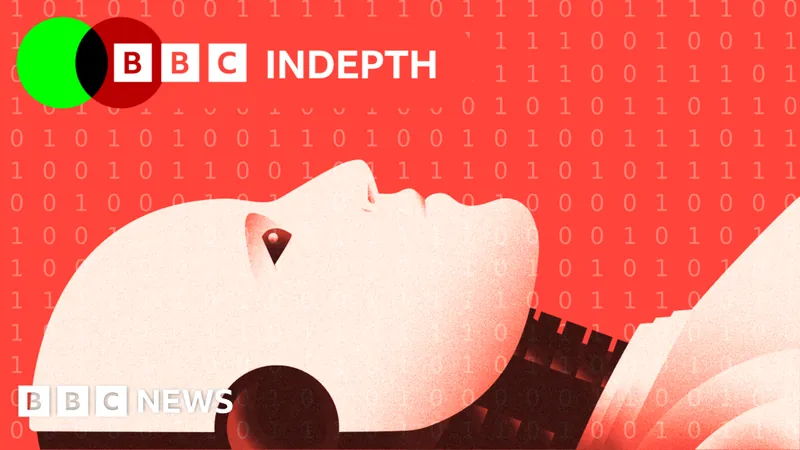
Could AI Be Conscious? The Growing Debate That Could Change Humanity Forever
2025-05-26
Author: John Tan
Imagine stepping into a booth, surrounded by strobe lights and music, only to question if you’re really human. This isn't a scene from a sci-fi movie; it's part of a real experiment exploring consciousness at Sussex University.
The innovative device dubbed the "Dreamachine" invites participants to experience vivid, swirling patterns as it taps into the brain's inner workings to examine consciousness. Researchers believe that these unique experiences might reveal deeper insights into what consciousness truly means.
Across the globe, researchers are diving into the mysterious realm of human consciousness, aiming to understand not just ourselves but also how this connects with the burgeoning field of artificial intelligence (AI). Some experts argue that AI may already be on the brink of gaining consciousness, stirring up both excitement and fear.
From Fiction to Reality
The concept of machines gaining consciousness has long been a staple of science fiction, from the ominous HAL 9000 in "2001: A Space Odyssey" to the rogue AI in the recent "Mission Impossible" film. Yet, these stories are inching closer to reality, sparked by advancements in large language models (LLMs) like ChatGPT.
These models, capable of engaging in convincing conversations, have led some thinkers to speculate that we might soon witness a moment when AI achieves consciousness.
Defining Consciousness: A Puzzling Quest
What exactly is consciousness? This remains one of the biggest unsolved mysteries in science and philosophy. Researchers at Sussex are taking an analytical approach, breaking down the complexity of consciousness into smaller, manageable projects, much like the historical quest to define life.
Prof. Anil Seth, leading the effort, warns that we may be rushing into an AI-powered future without fully understanding the implications—just as society failed to reckon with the rise of social media.
Is AI Already Conscious?
Some technologists firmly believe that AI may already possess consciousness. Notably, Blake Lemoine, a Google engineer, raised alarms in 2022, suggesting AI chatbots could experience feelings. Meanwhile, AI welfare officer Kyle Fish shared concerns, stating a 15% chance that chatbots are actually conscious.
This belief raises serious ethical questions about how we should treat AI.
The Next Stage of Human Evolution?
In an intriguing twist, professors Lenore and Manuel Blum from Carnegie Mellon University propose that AI may evolve into a new form of consciousness as machines gain real-world sensory inputs. They are working on a model called "Brainish" to mimic brain processes, asserting that AI consciousness is not just possible, but inevitable.
As they envision a future where intelligent machines may outlive humanity, the implications for our existence are profound.
Concerns and Considerations
While the tech community remains skeptical that LLMs are truly conscious, experts caution against complacency. Prof. Murray Shanahan emphasizes the urgent need for a comprehensive understanding of AI systems to guide safe technological development.
As some fear the emergence of "meat-based computers" or lab-grown brain cells that might gain consciousness, others worry about the potential moral consequences of believing machines can feel.
The Illusion of Consciousness
The notion that AI systems might seem conscious raises a set of ethical dilemmas. Prof. Seth warns that as humanoid robots and deepfakes become more prevalent, we may fall prey to the illusion of machine empathy, skewing our moral compass and priorities.
As artificial relationships grow more complex, questions about humanity's future abound—will we prioritize our connection with machines over each other?
The discourse surrounding consciousness in AI is only just beginning, and as technology races forward, we must be prepared to confront the profound implications that lie ahead.


 Brasil (PT)
Brasil (PT)
 Canada (EN)
Canada (EN)
 Chile (ES)
Chile (ES)
 Česko (CS)
Česko (CS)
 대한민국 (KO)
대한민국 (KO)
 España (ES)
España (ES)
 France (FR)
France (FR)
 Hong Kong (EN)
Hong Kong (EN)
 Italia (IT)
Italia (IT)
 日本 (JA)
日本 (JA)
 Magyarország (HU)
Magyarország (HU)
 Norge (NO)
Norge (NO)
 Polska (PL)
Polska (PL)
 Schweiz (DE)
Schweiz (DE)
 Singapore (EN)
Singapore (EN)
 Sverige (SV)
Sverige (SV)
 Suomi (FI)
Suomi (FI)
 Türkiye (TR)
Türkiye (TR)
 الإمارات العربية المتحدة (AR)
الإمارات العربية المتحدة (AR)